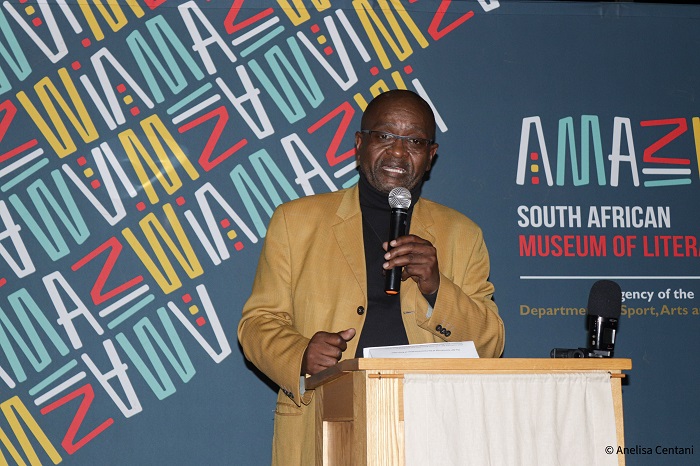By Sandile Dudu Saki
Amazwi South African Museum of Literature hosted Dr. Andile M-Afrika’s book launch on the evening of 12 September 2023. This was in line with the provincial commemorations of Steve Biko’s murder on 12 September 1977.
Whilst it remains a known fact that Steve Biko died at the hands of the Apartheid police, his ideals still live on. The book, which is a series of pocketbooks on the subject of Biko and Black Consciousness, can be read either separately or conjointly as a series and continuation of a single tribute.
Speaking at the launch, M-Afrika mentioned Biko’s long-standing comrade, the late Peter Cyril Jones, saying that the moment of silence that was observed in commemoration of Biko reminded him of Biko’s Jones. “They were traveling together from Cape Town, they were caught in this city and, detained separately, tortured in detention. Jones only heard about Biko’s death after Biko had been buried. It is a trauma that lived with Jones for a long time,” said M-Afrika.
Describing Makhanda as his home, M-Afrika also commented about the name given to Amazwi as having strong oral sentiments, as it does not say words but says voices (amazwi).
“I am happy to see how you centre African feeling and thought in your constructs. Today we are in the 46th year since Biko was killed. He was born in 1946, and this is the 46th year, so it is a full cycle of his political life” said M-Afrika.
The Dr. M-Afrika Conversations is a series of conversations about Black Consciousness. M-Afrika spoke of how, in 2012, he had invited Professor Bennie Khoapa to speak at a similar event. “He came to the event, and he had not written a speech. In fact, he stood up and held a pile of papers and said, ‘These are the speeches that I have been doing on behalf of Biko. What is there to say? What he was asking us to think about was, ‘How else can we do a memorial of Biko? We have been repeating ourselves a number of times. We’ve been talking to the pain of loss within us. Probably, Biko is laughing at us in his grave. What is it that we can do that can be creative enough, that can respond to our needs, and that can enhance our humanity?” asked M-Afrika.
M-Afrika believes that conversations are better than lectures. There is a sense of class mentality in lecturing, as one person who knows would be speaking to those who do not know. But on matters related to Biko, on matters of the struggle, each of us has a piece of experience to share. So that is why they are called conversations, he said.
The books are titled SASO – The Age of Philosophers, The Question of Blackness, 2020 Steve Bantu Biko Lecture, and A Review (of Biko’s Writings). There is also a biography, Steve Biko – The Eyes That Lit Our Lives. The 2020 Steve Bantu Biko Lecture is a response to Dr. Al Sharpton’s Lecture on 28 August 2020 to The Black Lives Matter movement. Each booklet has its own didactic story, as the editorial work on one of the oldest publications Biko had started with his colleagues, The SASO Newsletter. Some are even peer-reviewed by academics.
They are pocket-sized intentionally to make them accessible for those who are too lazy to read. But, most importantly, they are easily portable and easy to read even when standing in the queue at the bank, sitting in a taxi, or anywhere.
Above all, they are conversations on the relevance of Black Consciousness. This relevance should be taken for granted. M-Afrika says that if we continue to ask about the relevance of Black Consciousness, it is like asking if ‘The struggle was relevant.’


